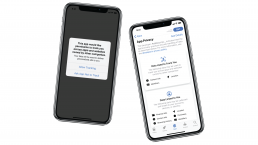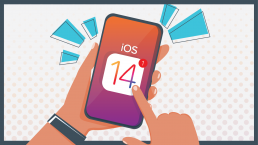Deliver a Powerful Virtual Commencement Experience
Graduation season is just about here! Even though we’re all grateful that national COVID-19 cases are finally dropping, you’re probably still feeling pressure to avoid a risky in-person event. Don’t worry—you can pull off an engaging virtual commencement experience, and we can help.
Spark451’s Virtual Commencement Support Package includes everything you need to deliver an event that is both memorable and special enough to satisfy your hard-working graduates and their families.
Check out the details, and then, reach out to discuss specific plans for your school!
The iOS 14 Update: How It May Impact Higher Ed
This spring, Apple is expected to release a significant update to the privacy settings on its iOS 14. The changes—which favor transparency for end-users over the targeting needs of marketers—could create significant hurdles for digital marketers in the higher education realm and beyond.
To help you understand how the forthcoming update may impact your campaigns, we’ll answer some of the key questions you’re probably asking yourself right about now.

So, What’s Happening With iOS 14?
With the new update, whenever users on iOS 14 launch a new app, they will now receive a prompt as part of Apple’s new App Tracking Transparency (ATT) feature that gives them a new type of control over who can access their data. The prompt will alert the user that their data may be collected, and they’ll be asked to choose whether they want to opt in or opt out of this tracking. This prompt will appear across all apps on iOS 14 devices, and we suspect that many tech-savvy users will opt out. (Until now, the default was to automatically opt in all users. In order to opt out, they had to know where to find the option in their settings.)
What Are the Ad Targeting Implications?
As an advertiser, it’s important to remember how much information these apps typically deliver about an individual’s circumstances and preferences. From web browsing history to TikTok videos watched and Facebook ads clicked, these apps track their users across the digital landscape, building demographic and psychographic profiles that can then be used in personalized ad targeting across digital platforms.
Basically, allowing users the ability to opt out of third-party tracking may limit the targeting personas we can build when we advertise. When it comes to Apple users, we’ll no longer have as robust targeting options available to use on platforms like Facebook, Instagram, or on display networks. This change won’t affect those who use Android phones, which are actually more popular worldwide than Apple devices. However, these changes may require digital marketers to get more creative in their targeting for Apple users. For example, in higher education, this may mean relying on alternative targeting strategies, such as creating lookalike audiences based on prior campaign conversion data.
What Else is Affected?
In addition to potential limitations in targeting, the new iOS will change the way we track conversions and report on them. Previously, Facebook utilized a 28-day conversion window and a seven-day view-through window, which means that a conversion could be counted within 28 days of a user clicking an ad or seven days of them seeing one. Now, however, Facebook is shifting to a seven-day conversion window for clicks and a one-day view-through window.
In terms of higher education, this may affect the numbers of conversions counted on select campaigns, as there’s a longer decision-making process within the vertical. For example, it may take a student a few weeks to take a high-value action, like beginning an application or making a deposit, and due to these changing rules, your Facebook ads may no longer receive credit for an action taken outside these conversion windows.
However, we don’t expect to see much change in our typical lead generation campaigns, as users usually take lower-stakes actions, such as inquiring, more quickly. In fact, based on our cumulative historical data, 99% of landing page inquiry submissions occur within the first seven days after the user has clicked an ad on Facebook or Instagram.
And What About the New Conversion Rules?
As if changing the conversion windows wasn’t enough, Facebook will also now require that ad domains are verified within your business manager account. This means each advertiser will have to have a verified domain in order to capture conversion actions, and if that domain isn’t verified, or if an advertiser tries to run ads to another unverified domain, those ads will not run. To ensure your domains are verified and that your ads can run, you may now require assistance from your web/IT team.
In combination with this change, Facebook is also implementing new conversion pixel policies. Previously, Facebook advertisers could track as many events (leads, clicks, applications, etc.) as they chose, but now, there will be a limit of eight per verified domain. Typically, in our higher education campaigns, we only use about three of these events, so this shouldn’t have a negative effect on our campaigns. However, it could pose an issue for institutions that utilize multiple digital vendors or that have different departments running and tracking campaigns at the same time. To help remedy this, Facebook will allow each verified domain to prioritize its eight conversion events. Though, if no action is applied, Facebook will default the ranking based on what they believe is the most relevant to your goals, based on your prior account activity.
How Can You Prepare?
It’s important to understand that these changes are occurring soon and to start strategizing the best ways to work around them. For example, any client utilizing UTM tracking and Google Analytics should be able to link conversions back to Facebook, even if they aren’t tracked within the platform. Additionally, if your CRM is able to capture UTM variables when a user submits a landing page, you’ll be able to effectively report on attribution even with the Facebook limitations in place.
Google will soon be implementing changes as well, as they prepare to end third-party cookie tracking. As these changes loom in the not-so-distant future, don’t hesitate to reach out, and keep an eye out for future blogs. Our digital advertising experts and seasoned enrollment strategists would be happy to help you navigate this new digital frontier.


